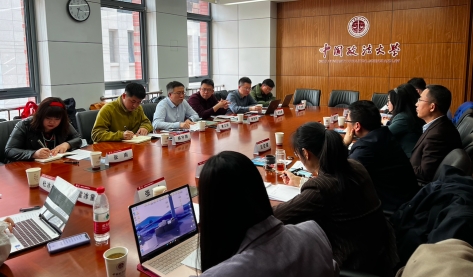On March 23, the Chinese Service Center for Scholarly Exchange (CSCSE) of the Ministry of Education held an informal discussion with China University of Political Science and Law (CUPL) at the Haidian Campus of CUPL. The meeting was organized by the Faculty Development Center of CUPL. The CSCSE delegation led by Huang Liqiong, Director of the Outward Exchange Division of CSCSE, Li Juqian, Director of the Office of International Cooperation and Exchange of CUPL; Wu Hongyao, Dean the National Institute of Legal Aid (NILA) of CUPL; and representatives of teachers with overseas background attended this meeting. The meeting was presided over by the Wang Wei, head of the Faculty Development Center of CUPL.

First, Huang Liqiong introduced the background and aim of the informal discussion as well as the plan of CSCSE to establish a legal aid mechanism for overseas students this year. He stated that Asian hate had been exacerbated by the universal circulation of the COVID-19 pandemic, which negatively impacted the safety of Chinese students studying abroad. He also expected to further understand the application of law in relevant disputes through discussions with law professors. They could, by doing so, better serve Chinese students overseas, such as helping them deal with actual difficulties encountered in their study and life and protecting their legal rights and interests.
Li Juqian answered the questions raised by CSCSE. As he pointed out, the domestic legal aid mechanism should serve as a platform for effective communication with Chinese students overseas. Of no less important was to let overseas students learn about how to defend their rights through legal means and to establish reasonable expectations for possible predicaments in their life abroad.
Wu Hongyao introduced the relevant work of NILA. He pinpointed that the domestic legal aid mechanism should serve as a platform for better communication and for wider popularization of law among overseas Chinese, for instance through tutorials and dissemination of typical cases. Meanwhile, overseas students should develop understanding of the culture and legal thinking in their destination countries to respond to and address challenges more effectively.
Then, attendees exchanged their views on issues, such as the development of an aid platform, popularization of the basic knowledge of the law, typical cases, as well as solutions to possible predicaments and challenges for students overseas.

